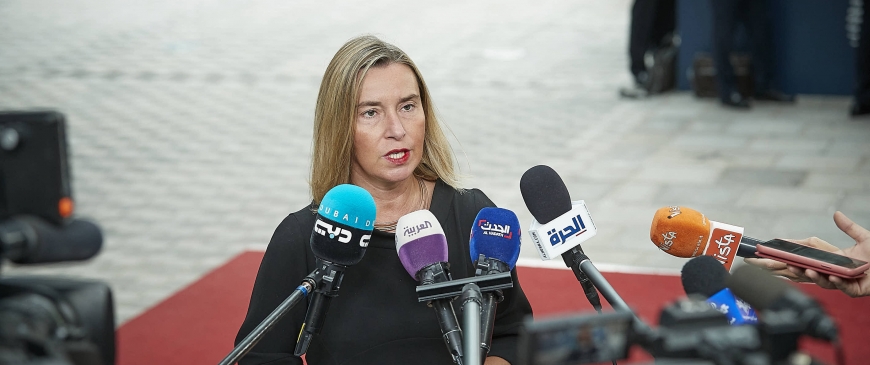
Gulf tension making it harder for EU to save Iran deal
Tensions between Europe and Iran are rising after Iran's seizure of a British-flagged tanker transiting through the Persian Gulf in mid-July.
Iran's move was in retaliation to the UK's seizure of an Iranian tanker off the coast of Gibraltar earlier in the month, on grounds that it was violating EU sanctions on Syria.
The UK has called for a European naval force to protect international shipping through the Persian Gulf, which Tehran has branded a provocation.
The spat over the two tankers is only the latest round of escalation in Europe-Iran tensions after Iran's moves in late June and early July to ramp up its nuclear programme beyond the limits set by the 2015 international agreement.
Iran complied with the Joint Comprehensive Plan of Action (JCPOA) for over a year after Donald Trump announced in May 2018 that the US would withdraw from the nuclear agreement and re-impose sanctions, in the hope that the remaining signatories, Europe, Russia and China, would maintain trade.
But as US sanctions drove business away, the Iranian economy suffered, and Iranian leaders were increasingly convinced that fully respecting the deal was no longer worth it.
So far, Iran has only moderately exceeded the parameters of the nuclear agreement: it is enriching uranium to below five percent, which is above the level permitted by the deal but well below the 90 percent level needed for producing nuclear weapons.
Iran has said it is willing to reverse its transgressions if Europe, Russia and China are able to restart trade.
However, if this does not happen, Iran has said it will take further gradual steps to expand its nuclear programme. Iran calculates that by escalating both its nuclear activities and its provocations in the region it can force the risk-averse Europeans to provide it with relief from the US sanctions.
At the same time, it thinks that escalation may also pressure Trump to ease sanctions, by risking a war that his domestic base does not want.
This is a risky strategy: while Trump has often said he does not want conflict, the US and Iran could stumble into one if they misjudge each other's red lines.
In June, after Iran downed a US drone, Trump said he had called off retaliatory air strikes with just 10 minutes to spare after being told 150 people would die. Tehran's moves will also make it more difficult for Europeans to support the nuclear deal, and make them less willing to provide Iran with sanctions relief.
Choice for Johnson?
Europeans are already under pressure to back the US and re-impose sanctions, and splits within the EU could appear. The UK's new prime minister, Boris Johnson, may be increasingly tempted to side with the US to gain favour in Washington.
Europeans should resist the pressure to back the US approach as long as Iran's expansion of its nuclear activities remains limited and easily reversible.
They should not allow concerns over Tehran's provocative foreign policy to affect their support for the nuclear agreement, which still serves Europe's interest by limiting Iran's nuclear programme.
Re-imposing EU sanctions at this stage would risk pushing Iran towards resuming a full throttle nuclear programme and denying international inspectors access to its facilities.
These moves would make it easier for Iran to obtain nuclear weapons, and further raise the risk of a military intervention by the US.
Europeans should use diplomacy and financial incentives to push Iran to respect the deal's limits on enrichment.
In 2018, the Europeans launched a financial instrument, Instex, which aimed to enable companies to trade with Iran without being hit by the US sanctions, but the mechanism does not yet work.
They should ensure that Instex can fulfil its intended purpose, rapidly building up the volume of transactions in non-sanctioned goods carried out. Europe should also coordinate with Russia and China to enable Iran to sell some oil, whether through Instex or another mechanism.
At the same time, Europeans should also clarify that they are unwilling to tolerate restrictions on freedom of navigation or a further significant expansion of Iran's nuclear programme. Diplomacy can resolve the standoff over the captured British and Iranian tankers.
And the risk of future incidents can be prevented if Europeans go along with the UK's idea of a European naval force: several member states, including France, have indicated they are willing to participate.
To prevent a further expansion of Iran's nuclear programme, Europeans should co-ordinate with Russia and China to state that if Iran develops its nuclear programme much further, for example enriching uranium in a sustained manner beyond the important 20 per cent threshold, that would result in a co-ordinated re-imposition of sanctions.
Those sanctions could be phased in gradually, to give Iran the chance to rethink and change course.
At the same time, Europe should mediate between the US and Iran.
Europeans should try to steer the US away from putting ever more pressure on Iran, and make use of their lines of communication with Tehran to highlight the risk that further expansion of the nuclear programme will provoke US military strikes.
At the same time, Europe should also try and persuade Trump that allowing Iran to sell some oil is in the US' interest, as it makes it less likely that Iran will further expand its nuclear programme or lash out, and more likely that it will agree to the talks he says he wants.
Luigi Scazzieri is a research fellow at the Centre for European Reform.
